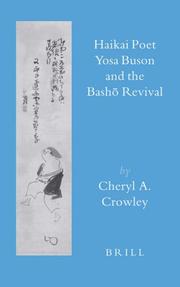| Listing 1 - 2 of 2 |
Sort by
|
Book
ISBN: 9789004311183 9004311181 9004311211 9789004311213 Year: 2016 Volume: 56 Publisher: Leiden, Netherlands ; Boston, Massachusetts : Brill,
Abstract | Keywords | Export | Availability | Bookmark
 Loading...
Loading...Choose an application
- Reference Manager
- EndNote
- RefWorks (Direct export to RefWorks)
In Reading Japanese Haikai Poetry Herbert Jonsson makes an inquiry into the multitude ways in which Japanese linked haikai poetry has been read and understood. A number of poems composed by the eighteenth-century master Yosa Buson are analyzed in great detail. Although closely related to the popular haiku, haikai is often regarded as difficult for non-specialists, but this study offers the reader a wealth of explanations, displaying the varied perspectives available. The first part of the book consists of a thorough investigation of how these poems have been interpreted in the Japanese commentary tradition. The second concluding part offers an innovative study of the poetics of scent ( nioizuke ), essential for understanding the creative force of this poetry.
J5730 --- J5720 --- Japan: Literature -- poetry -- haiku, haikai --- Japan: Literature -- poetry -- renga, renku, hokku --- Haikai --- History and criticism. --- Yosa, Buson, --- Taniguchi, Chōkō --- Sha, Shunsai --- Buson, Yosa --- Buson --- Taniguchi, Buson --- 与謝無村 --- 与謝蕉村 --- 与謝蕪材 --- 与謝蕪村 --- 与谢蕪村 --- 與謝無村 --- 與謝蕪村 --- 谷口蕪村 --- Criticism and interpretation.

ISBN: 9004157093 9789004157095 9786611458300 1281458309 9047411919 9789047411918 9781281458308 6611458301 Year: 2007 Volume: 27 Publisher: Leiden ; Boston : Brill,
Abstract | Keywords | Export | Availability | Bookmark
 Loading...
Loading...Choose an application
- Reference Manager
- EndNote
- RefWorks (Direct export to RefWorks)
This book uses the haikai verse and paintings of the brilliant, innovative artist Yosa Buson (1716-1783) as a focal point from which to explore how Japanese writers competed for artistic authority in a time when popular responses to economic, technological, and social changes were creating the beginnings of a modern literature. The first part of the book discusses Buson's role in the Bashō Revival movement, situating his haikai in the context of the social networks that writers of his time both relied on and resisted. The second part explores Buson's hokku , linked verse, and haiga (haikai painting). The book concludes with a discussion of Buson's reception in the modern period, and includes translations of his principal works.
J5730 --- J5500.60 --- J2284.60 --- Japan: Literature -- poetry -- haiku, haikai --- Japan: Literature -- history and criticism -- Kinsei, Edo, Tokugawa period, early modern (1600-1867) --- Japan: Genealogy and biography -- biographies -- Kinsei, Edo, Tokugawa period, early modern (1600-1867) --- Haikai --- Japanese poetry --- History and criticism --- Matsuo, Bashō, --- Yosa, Buson, --- Taniguchi, Chōkō, --- Buson, --- Sha, Shunsai, --- Taniguchi, Buson, --- Buson, Yosa, --- 与謝無村, --- 与謝蕉村, --- 与謝蕪材, --- 与謝蕪村, --- 与谢蕪村, --- 與謝無村, --- 與謝蕪村, --- 谷口蕪村, --- Matsuo, Munefusa, --- Bashō, --- Bashō-ō, --- Tōsei, --- Hakusendō, --- Tentenken, --- Katōten, --- Katōen, --- Hōbi, --- Yōkaku, --- Bashōan Tōsei, --- Mat︠s︡uo, Basë, --- Bashō, Matsuo, --- Matsuo, Basyo, --- Basyo, --- Matsuo, Kinsaku, --- Басë, Мацуо, --- בשו --- 与谢芭蕉, --- 松尾笆蕉, --- 松尾芭焦, --- 松尾芭蕉, --- 松尾芭蕪, --- 松尾蕉, --- 芭蕉, --- 麻生磯次, --- Matsuo, Bashō --- Bashō, Matsuo --- History and criticism. --- Matsuo, Bashō, --- Taniguchi, Chōkō --- Sha, Shunsai --- Buson, Yosa --- Buson --- Taniguchi, Buson --- 与謝無村 --- 与謝蕉村 --- 与謝蕪材 --- 与謝蕪村 --- 与谢蕪村 --- 與謝無村 --- 與謝蕪村 --- 谷口蕪村 --- 松尾, 芭蕉
| Listing 1 - 2 of 2 |
Sort by
|

 Search
Search Feedback
Feedback About
About Help
Help News
News